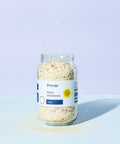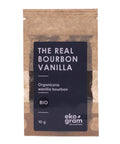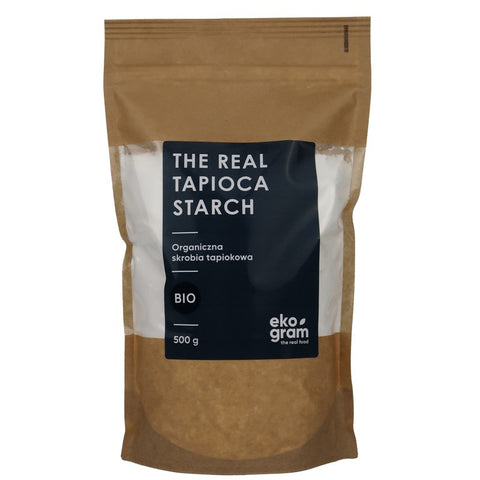Cassava – the potato “from the tropics”
Cassava is one of the most widely cultivated tropical plants, and its tubers are the equivalent of the native potatoes you know well. Both of these products are a source of carbohydrates and are the basis for preparing many dishes characteristic of the region from which they come. As for cassava, it is from it that tapioca, known in the culinary world, is made (it can come in the form of balls, flour or flakes), but it is also a source of tapioca starch (also known as cassava starch). Cassava starch is made by grinding, rinsing, drying and milling cassava tubers, similarly to how potato starch is made from potatoes.
Cassava starch is white, tasteless and odorless, so it does not affect the taste of the dishes served, and its use can be very wide - you will learn about it in the following paragraph).
Cassava starch – an ingredient that will diversify your kitchen
Cassava starch is an incredibly versatile ingredient that can completely change your approach to cooking and baking. As mentioned above, it has a neutral taste, is very loose and delicate, and has thickening and gelatinizing properties.
- This makes it a perfect substitute for potato or corn starch in sauces or soups, giving them a velvety consistency.
- Cassava starch is also irreplaceable in baking, especially gluten-free ones – it improves the structure of cakes and breads, making them light and fluffy.
- Cassava starch is also widely used in meat products, where it acts as a natural thickener, helping to obtain the right consistency, especially in home-made pâtés, but also (less often) in cold meats and sausages.
- Thanks to its gelatinizing properties, it works great in desserts such as jellies, kissels or homemade jams, giving them a pleasantly smooth, yet compact and non-watery structure.
More generally, the uses of cassava starch may include:
- Gluten-free diets – tapioca is suitable for people who do not consume cereals containing gluten or contaminated with it (e.g. wheat, barley, rye, oats),
- Paleo diet – tapioca flour, like coconut and almond flour, can be used instead of wheat flour (as the Paleo diet avoids many grains, especially highly processed ones),
- Easily digestible diet – cassava starch is an easily digestible product – its digestibility is higher than in the case of potatoes and comparable to rice. Thanks to this, it can be consumed by people on an easily digestible diet, i.e. those suffering from digestive system diseases such as irritable bowel syndrome.
- Baked goods, meat products, homemade desserts, soups.
Important! Tapioca is a product safe for health, does not cause side effects and there are no contraindications to its consumption, so you can safely include it in your diet.
If you don't have it in your kitchen yet, it's worth changing that and seeing how many possibilities this inconspicuous but incredibly effective ingredient offers. However, if its wide application doesn't convince you enough, then stop for a moment on the properties of tapioca starch, and especially on a certain latest scientific report from 2025...
Tapioca starch in the light of the latest research (2025)
It is not new that tapioca is a source of resistant starch in the diet. Yes, tapioca starch contains so-called "resistant" starch, which is one that is not easily digested in the intestines, which lowers the glycemic index of meals. Thanks to this, especially after cooling (e.g. in processed meats or in homemade cold desserts), it is recommended for people with insulin resistance, because it helps stabilize blood sugar levels, which can support proper glycemia.
But the latest research, published in January 2025, sheds new light on tapioca starch. It has been shown to have some potential in the fight against obesity (and not only). Scientists have proven that a specific fraction of tapioca starch (so-called RT-90) has an exceptionally high resistance to digestion in the digestive tract. It reaches the large intestine intact, where it becomes a breeding ground for intestinal bacteria that have a beneficial effect on our health.
A study conducted on mice fed a high-fat diet proved that supplementation with this fraction of tapioca starch resulted in a significant weight loss among the tested mice compared to the control group - i.e. mice that were not supplemented. Animals given this specific fraction of starch had better glycemia (blood sugar) values, which indicates improved glucose tolerance. Reduced fat accumulation was also observed in the liver of supplemented animals, which means reduced fatty degeneration of this organ.
These findings suggest that tapioca, or rather tapioca starch, may play a significant role in fighting obesity. Furthermore, as the authors of the study suggest, introducing cassava starch into the diet may indirectly improve overall health, as they showed reduced oxidative stress and reduced inflammation in supplemented mice.
Dietitian's comment on the aforementioned reports: "Tapioca starch is an interesting ingredient in the diet of people with insulin resistance because it is actually a source of resistant starch that is beneficial for glycemia. Although starch has a high glycemic index, its consumption in small portions, especially when cold, can help stabilize blood sugar levels. Why cold? Chilling starchy products leads to the formation of more resistant starch in them. It is therefore worth including tapioca starch in the diet, especially in the context of its anti-diabetic potential, but remember these two rules - small portions and preferably after cooling."
A handful of properties of tapioca and tapioca starch
Tapioca is a moderately caloric product – the energy value is 358 kcal/100 g and is similar to other carbohydrate products (groats, rice, pasta). Cassava starch is usually consumed in small quantities, most often as an addition to preserves, meals, so we eat a maximum of a few teaspoons during a meal. One tablespoon of tapioca starch, about 10 g, is therefore about 36 kcal. The main component of this product is, of course, carbohydrates (you can find the nutritional value of the product in the table below).
Interestingly, due to its low protein content, tapioca can be found in the diet of people on a low-protein diet. On the other hand, however, in cassava starch, minerals and vitamins are unfortunately present in very small amounts. But that's no problem, because as you already know, cassava starch is most often used as an addition to dishes. Therefore, although the starch itself mainly provides carbohydrates, it can be an element of a nutritious, full-value meal in the context of vitamins and minerals.
Where to buy tapioca (cassava) starch?
If you are already convinced to buy this interesting (both culinary and scientific) product, then the easiest way to buy it is in our store. Our tapioca starch is of the highest quality, fully natural and comes from organic farming in Thailand. We use it regularly ourselves and highly recommend it!
Bibliography:
- Liao CC, Chen SY, Chen YY, Huang CC, Pan RY, Yen GC. Characterization of a novel type 4 resistant starch from tapioca and its obesity-preventive effects through gut microbiota modulation in high-fat diet-treated mice. Int J Biol Macromol. 2025 Mar;295:139577.
- Rai S, Kaur A, Chopra CS. Gluten-Free Products for Celiac Susceptible People. Front Nutr. 2018 Dec 17;5:116.
- Nieto-Martínez R, Hamdy O, Marante D, Marulanda MI, Marchetti A, Hegazi RA, Mechanick JI. Transcultural diabetes nutrition algorithm (tDNA): Venezuelan application. Nutrients. 2014 Apr 2;6(4):1333-63.
- Zhu F. Composition, structure, physicochemical properties, and modifications of cassava starch. Carbohydr Polym. 2015 May 20;122:456-80.
See the recipe for magical Brazilian tapioca pancakes
Nutritional value per 100 g
- energy value1498 kJ / 358 kcal
- fat0,02 g
- including unsaturated fats0,01 g
- carbohydrates88,69 g
- including sugars3,35 g
- protein0,19 g
- salt<0,01 g
























